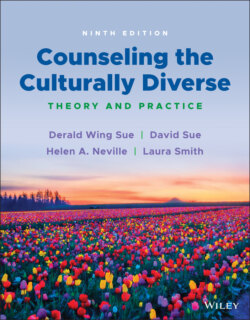Читать книгу Counseling the Culturally Diverse - Laura Smith L. - Страница 18
REFLECTION AND DISCUSSION QUESTIONS
Оглавление1 How do you explain the different expectations that these two trainees have about a course on multicultural counseling and therapy?
2 Part of becoming a multiculturally competent counselor or therapist is the ability to understand the worldview of clients. What in the lived experience of these two individuals might explain their outlooks?
3 How much does your own racial background affect your perception of these two narratives?
4 Both trainees approach the course with some unease. From analyzing the statements, can you determine what fears they have?
5 Take a few moments to reflect upon your own expectations for the course. What would you like to have covered? What apprehensions or concerns do you have about the course? Can you give voice to them?
6 Because of the changing demographics of the nation, no helping professional can escape from encountering diverse clients. Are you comfortable in talking about issues of differences, marginalization, racism, sexism, and heterosexism with them? If not, what does this mean for you as a helping professional?
Students are frequently asked at the beginning of a course on MCT, what expectations they have. One of the more common responses from White trainees is revealed in the quote above. Reading between the lines, the White trainee seems to be implying that (a) learning about race, ethnicity, gender, and sexual orientation is purely a cognitive or intellectual exercise, (b) emotion is antagonistic to reason, (c) “politics” should be left outside of the classroom, and (d) as a White person, he/she may be blamed for all the racial/ethnic injustices of the world. As we shall see shortly, these expectations are setting up the White student for a very challenging experience in the course.
On the other hand, students of color also approach courses on race with great trepidation. Their concerns are different from that of their White counterparts. They silently ask, “Will my voice be heard or not?” Their experience is that (a) honesty and authenticity in discussing race issues are often absent or glossed over in classes, (b) that when discussed they are “sugar‐coated,” avoided, dismissed, or rationalized away, (c) that students of color are silenced from expressing their emotionality for fear of being labeled “angry or irrational,” and (d) that they are caught in a double‐bind in that they are asked to share their true thoughts and feelings, but are invalidated when they do.
